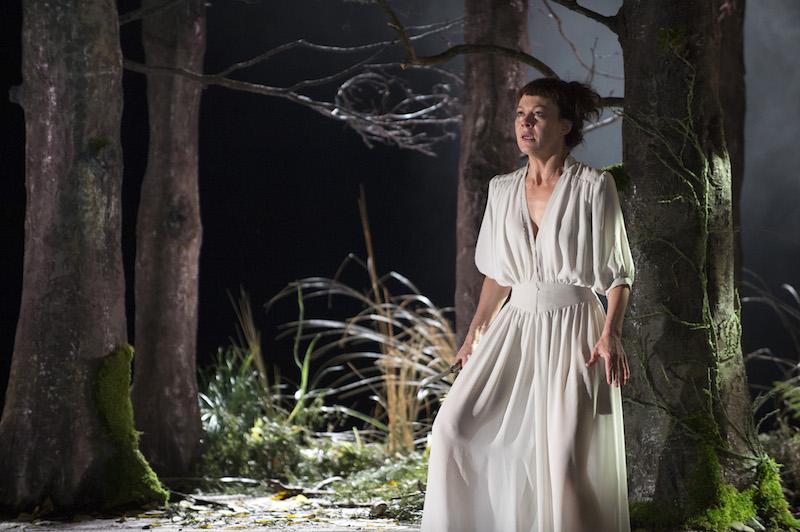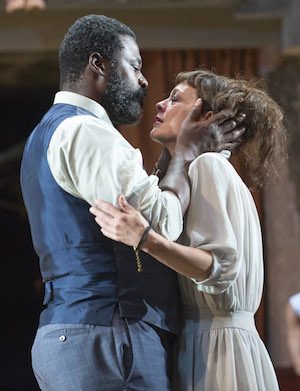Medea, National Theatre | reviews, news & interviews
Medea, National Theatre
Medea, National Theatre
An updating of Euripides which retains its mythical power

We know how the story ends, but then so did Euripides' first audience in Athens in 431 BC. Medea was already a familiar character of myth, a sorceress whose ungovernable passion for Jason led her to commit horrible murders when he abandoned her for another woman. Now, as in the Golden Age of Greek drama, the chief interest is in the way the tale is told.
Ben Power, writer of this version, and Carrie Cracknell, director, have both dealt with the classics in innovative ways before. Power's A Tender Thing retold Romeo and Juliet with much older actors in the lead roles and Cracknell's A Doll's House, with a vital young couple at its heart, reinvigorated Ibsen in an award-winning production that went from the Young Vic to the West End and New York. These two are joined by experimental choreographer Lucy Guerin, with Will Gregory and Alison Goldfrapp in charge of the music. But this galaxy of talent would be nothing without a Medea able to carry the extraordinary burden of the tragedy and Helen McCrory is simply stunning in the title role.
She has sacrificed much for a man who now prefers another
A tiny, feminine figure with a deep, resonant voice and a commanding presence, McCrory explores every nuance of a character famous for committing the most unforgivable crime in literature: the murder of her own children. She is down-to-earth (she enters cleaning her teeth) but powerful, manipulative, broken-hearted, loving and relentless. She wants to take control of her life - Euripides sympathised with the limited role of women - and she has sacrificed much for a man who now prefers another.
Before the play begins, Medea has already killed her brother while escaping Colchis with Jason (Danny Sapani, pictured with McCrory) after employing her magic powers to help him gain the Golden Fleece. They have been settled in Corinth for some years and have two sons when Jason decides to improve his status by abandoning Medea for the king's young daughter. Medea's jealous fury overwhelms her reason and she murders first her rival and the king with a poisoned garment, and then those whom Jason loves most.
 Tom Scutt's dual level set for the Olivier reveals Medea's shabby household with nature on its doorstep in the shape of sturdy tree trunks, while a more glamorous court disports itself above, almost out of sight. The design fits the Power/Cracknell decision to modernise the language and explore the characters' psychology intensely, while at the same time retaining the sense of magic, of strangeness. Often when the Greeks are updated, references to the gods stick out as odd: if human beings have no power over their destiny, how can we hold them responsible? The question doesn't arise here in this world, half way between suburbia (where the kids play computer games and Jason gets out his mobile for a keepsake shot of himself with his sons) and untamed nature, between a now of visceral emotion and a cooler, mythical then. The Chorus, women of Corinth in floral dresses, twitch and shudder in Guerin's choreography, expressing Medea's pain and confusion as much as their own horror, to music which goes from gently atmospheric to operatic to almost ecclesiastical as the mood requires.
Tom Scutt's dual level set for the Olivier reveals Medea's shabby household with nature on its doorstep in the shape of sturdy tree trunks, while a more glamorous court disports itself above, almost out of sight. The design fits the Power/Cracknell decision to modernise the language and explore the characters' psychology intensely, while at the same time retaining the sense of magic, of strangeness. Often when the Greeks are updated, references to the gods stick out as odd: if human beings have no power over their destiny, how can we hold them responsible? The question doesn't arise here in this world, half way between suburbia (where the kids play computer games and Jason gets out his mobile for a keepsake shot of himself with his sons) and untamed nature, between a now of visceral emotion and a cooler, mythical then. The Chorus, women of Corinth in floral dresses, twitch and shudder in Guerin's choreography, expressing Medea's pain and confusion as much as their own horror, to music which goes from gently atmospheric to operatic to almost ecclesiastical as the mood requires.
At the end, this Medea does not escape in a chariot drawn by dragons provided by her grandfather, the sun god, Helios, but drags away the children's bodies in their bloody sleeping bags. And, in McCrory's performance, clearly mad with grief rather than merely delighting in Jason's pain, she achieves at least the right to an understanding of what his behaviour has brought her to.
Michaela Coel as the Nurse addresses the audience simply, directly, involving us as witnesses and Danny Sapani's self-deluding Jason suffers agony at the loss of his sons. Beyond the control of either, McCrory is heart-rending, unforgettable.
rating
Explore topics
Share this article
The future of Arts Journalism
You can stop theartsdesk.com closing!
We urgently need financing to survive. Our fundraising drive has thus far raised £49,000 but we need to reach £100,000 or we will be forced to close. Please contribute here: https://gofund.me/c3f6033d
And if you can forward this information to anyone who might assist, we’d be grateful.

Subscribe to theartsdesk.com
Thank you for continuing to read our work on theartsdesk.com. For unlimited access to every article in its entirety, including our archive of more than 15,000 pieces, we're asking for £5 per month or £40 per year. We feel it's a very good deal, and hope you do too.
To take a subscription now simply click here.
And if you're looking for that extra gift for a friend or family member, why not treat them to a theartsdesk.com gift subscription?
more Theatre
 Hamlet, National Theatre review - turning tragedy to comedy is no joke
Hiran Abeyeskera’s childlike prince falls flat in a mixed production
Hamlet, National Theatre review - turning tragedy to comedy is no joke
Hiran Abeyeskera’s childlike prince falls flat in a mixed production
 Rohtko, Barbican review - postmodern meditation on fake and authentic art is less than the sum of its parts
Łukasz Twarkowski's production dazzles without illuminating
Rohtko, Barbican review - postmodern meditation on fake and authentic art is less than the sum of its parts
Łukasz Twarkowski's production dazzles without illuminating
 Lee, Park Theatre review - Lee Krasner looks back on her life as an artist
Informative and interesting, the play's format limits its potential
Lee, Park Theatre review - Lee Krasner looks back on her life as an artist
Informative and interesting, the play's format limits its potential
 Measure for Measure, RSC, Stratford review - 'problem play' has no problem with relevance
Shakespeare, in this adaptation, is at his most perceptive
Measure for Measure, RSC, Stratford review - 'problem play' has no problem with relevance
Shakespeare, in this adaptation, is at his most perceptive
 The Importance of Being Earnest, Noël Coward Theatre review - dazzling and delightful queer fest
West End transfer of National Theatre hit stars Stephen Fry and Olly Alexander
The Importance of Being Earnest, Noël Coward Theatre review - dazzling and delightful queer fest
West End transfer of National Theatre hit stars Stephen Fry and Olly Alexander
 Get Down Tonight, Charing Cross Theatre review - glitz and hits from the 70s
If you love the songs of KC and the Sunshine Band, Please Do Go!
Get Down Tonight, Charing Cross Theatre review - glitz and hits from the 70s
If you love the songs of KC and the Sunshine Band, Please Do Go!
 Punch, Apollo Theatre review - powerful play about the strength of redemption
James Graham's play transfixes the audience at every stage
Punch, Apollo Theatre review - powerful play about the strength of redemption
James Graham's play transfixes the audience at every stage
 The Billionaire Inside Your Head, Hampstead Theatre review - a map of a man with OCD
Will Lord's promising debut burdens a fine cast with too much dialogue
The Billionaire Inside Your Head, Hampstead Theatre review - a map of a man with OCD
Will Lord's promising debut burdens a fine cast with too much dialogue
 50 First Dates: The Musical, The Other Palace review - romcom turned musical
Date movie about repeating dates inspires date musical
50 First Dates: The Musical, The Other Palace review - romcom turned musical
Date movie about repeating dates inspires date musical
 Bacchae, National Theatre review - cheeky, uneven version of Euripides' tragedy
Indhu Rubasingham's tenure gets off to a bold, comic start
Bacchae, National Theatre review - cheeky, uneven version of Euripides' tragedy
Indhu Rubasingham's tenure gets off to a bold, comic start

Add comment